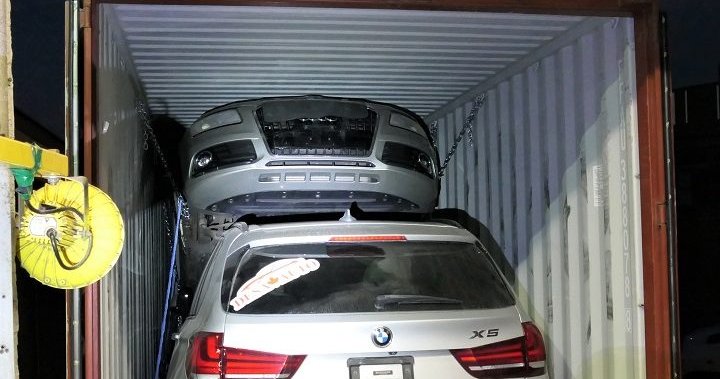Det. Scott Herriot says that the Ottawa Police Service have seen rates of vehicle thefts get progressively worse in the nation’s capital over the last five years.
“We saw an uptick in trends from 2018 where we saw about 70 vehicles being stolen in Ottawa. Obviously, progressively in 2019 we saw 125, in 2020 we were up to 218, then in 2021 we jumped to 420, in 2022 we were around the 1,289 mark, and 2023 we’re about the same. So, we’re running at about a 1,300 for the year,” Herriot said in an interview with Global News on Monday.
Ottawa is not alone in seeing this increase of vehicle thefts, and Herriot spoke following the news Sunday afternoon at the Liberal cabinet retreat that Ottawa plans to launch a summit to tackle rampant vehicle thefts now being billed as a national “crisis.”
In 2022, vehicle thefts rose 50 per cent in Quebec year-over-year, with Ontario seeing almost the same increase. Atlantic Canada saw a 35-per cent bump in vehicles thefts.
On Monday, the York Regional Police, in association with Canada Border Services Agency and Équité Association, announced the recovery of 52 stolen vehicles worth more than $3.2 million and charged 11 people with a combined 96 offences.
Police named the investigation Project Mamba, which began last October. Police said the group targeted high-end vehicles across the Greater Toronto Area and southwestern Ontario with plans to ship them as far away as Azerbaijan and Georgia.

Brian Gast, vice-president of investigation services with Équité Association, tells Global News organized crime groups like this are driving the spike in auto-thefts.
“It’s really been the last two or three years since the pandemic that the numbers have really spiked largely because of organized crime, really targeting Ontario and Quebec; high population, high number of targeted vehicles and the proximity to the ports,” Gast explained.
“So, it is a national problem. So, it’s very difficult to work solutions regionally. Everybody’s got to come together.”
This is why Gast and Herriot say they are both glad to see the federal government organizing the summit on the issue, which will take place on Feb. 8 in Ottawa. The plan is to bring together national, provincial and municipal law enforcement agencies, the CBSA and auto-makers to talk about short and long-term solutions.
Get the latest National news.
Sent to your email, every day.
“One of the things that concerns all of us is it’s becoming a violent crime where people are assaulted in the process of stealing vehicles,” Public Safety Minister Dominic LeBlanc said in announcing the plan.
“So we think it’s an important opportunity for us to work with partners across the country and take action to deal with something that’s increasingly becoming a concern in every part of the country.”
The question now is, what can be done to tackle the problem?
What happens when vehicles are stolen?
Herriot says these operations can be very lucrative all the way through a criminal enterprise.
“Right from the young guys that they’re recruiting to drive, all the way to a gentleman that are sort of in the periphery that might be organizing small groups here that come to Ottawa and even further up to gentlemen that are looking at shipping vehicles, whether it’s a smaller cell or even larger group,” he explained.
Herriot added that Ottawa is an easy destination, where a vehicle could make it from the capital to the Port of Montreal in two hours. However, he says that vehicles are often stored somewhere first, then loaded into shipping crates before being transported to ships.
“Sometimes things are x-rayed. Sometimes things aren’t,” he said.
The detective added vehicles often aren’t as high on the contraband priority list as drugs and guns in these searches.
York police saw the same tactic in Project Mamba.
“We’re quite stricken with the fact that this group was prolific. They they moved quickly, they moved efficiently, and they stole a fair number of vehicles with with relative ease. This is an organized group that was relatively sophisticated,” Sgt. Clint Whitney with the York Regional Police told Global News.
Whitney called operations like this an “extremely lucrative” business, but ultimately this bust is a speed bump in a larger issue.
“We’re happy we consider this to be a success story. At the same time, though, we remain all too aware of the fact that this is an ongoing problem, and there’s still a lot of work to do,” he said.
Whitney says police became aware of stolen vehicles being stored in a residential area in October.
“They use that area as a place to, as we say, cool off their vehicles after they’ve been stolen before they would move them to other locations, and then ultimately put them in cargo containers for shipping,” Whitney explained.
Once at sea, vehicles can easily end up on the other side of the world.
A Global News analysis of a Nigerian website similar to Kijiji found a handful of vehicles with American license plates and one Lexus with Alberta plates clearly on display.

“It’s occurring at all ports. It’s significant at the Port of Montreal. So much so we’re having vehicles that are being transported or sent to the Port of Montreal from all parts of Canada, even in the west,” Gast said.
From there, Gast said that criminal networks exist that ship vehicles to west Africa, parts of Europe and the Middle East.
He added that this is sometimes done to launder money through vehicle sales or help fund other riskier ventures like gun and drug trades. Compared to these, Gast said trafficking vehicles is relatively low risk and offers high reward.
As for what’s contributing to the spike over the last few years, Gast says it comes down to pandemic supply chain issues increasing the value of cars.
“Whether it be the chip for the vehicle itself, new and used vehicles, the criminals have got into the market,” Gast said.
“Many, many groups are now engaging in this criminal activity and profiting from that opportunity of the supply chain issues.”
Gast is hopeful the summit on Feb. 8 will lead to strategies to better address the issue.
“It really starts from the beginning, making the vehicle harder to steal in the first place, to the enforcement piece and the prevention piece,” he said about what needs to be done.
As for what you can do to protect your vehicle, Gast suggests using options like a steering wheel lock, parking in a garage, onboard diagnostic port lock, an aftermarket immobilizer or a third-party tracking device like an AirTag.
Herriot says that he’s worked cases where AirTags turned up vehicles in Tangier and Morocco.
— with files from Global News’ Nathaniel Dove, Kyle Benning and The Canadian Press.




